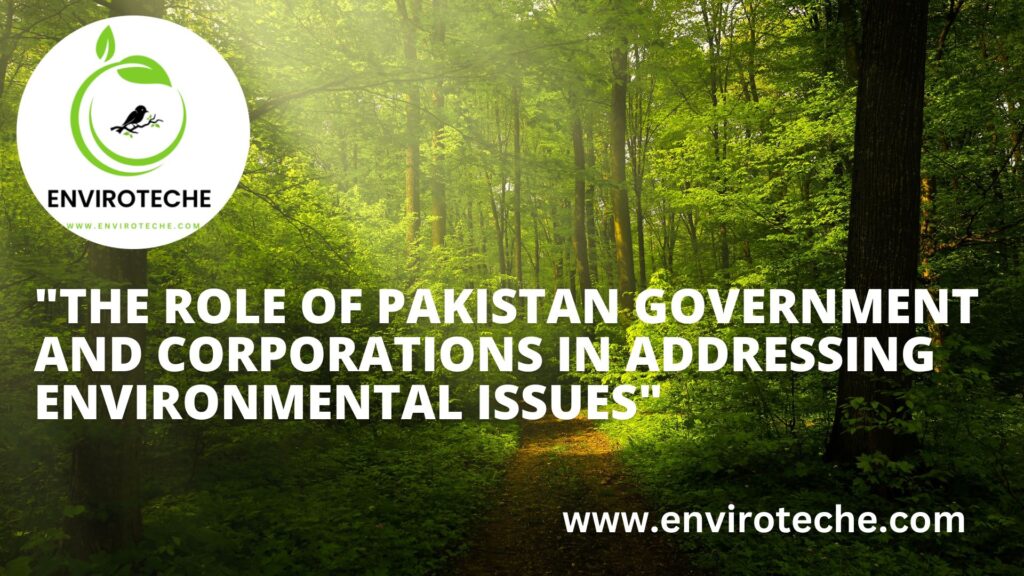
Shazma Ilyas1, Muhammad Ali Amir1
1Department of Environmental Sciences, Government College University Faisalabad
Pakistan Government and Corporations
Pakistan’s ecological balance, public health, and economic growth are all at risk due to a number of environmental issues. Particularly in metropolitan areas, where high levels of pollutants induce respiratory disorders and waterborne diseases, air, and water pollution are serious problems. Another major issue is deforestation, which is brought about by logging, agriculture, and urbanization reducing the amount of forest cover.
These problems are made worse by climate change, which also affects infrastructure and has an impact on food security, water availability, and weather patterns. Floods, landslides, and earthquakes can all affect Pakistan, causing further environmental disruption and suffering for people. Government, business, civil society, and the general public must work together to address these issues.
The Role of Pakistan’s Government in Addressing Environmental Issues
In order to solve environmental challenges in the nation, the Pakistan government and corporations has adopted a number of actions. The right to a clean environment is recognised by the Pakistani Constitution, and the nation has various environmental laws and regulations in place, including the Climate Change Policy (2012), the National Forest Policy (2015), and the Pakistan Environmental Protection Act (1997).
The Environmental Protection Agency is in charge of carrying out environmental impact analyses, providing permits for industrial activity, and enforcing these laws. To encourage environmental sustainability, the government has also launched programmes including the Clean Green Pakistan campaign and the Billion Tree Tsunami Initiative. However, there are still issues with enforcing these rules and putting in place efficient environmental regulations.
An Analysis of the Effectiveness of Pakistan’s Environmental Policies and the Challenges Faced in Implementing Them
Several environmental policies and laws have been established in Pakistan, however, a number of issues have limited their efficacy. The absence of enforcement and oversight of these policies, which results in non-compliance by businesses and individuals, is a significant problem. Inadequate financing, technical capability, and institutional setups are additional significant obstacles that hinder the application and efficacy of environmental legislation.
Other problems that hinder the success of environmental initiatives include political instability, corruption, and low public knowledge. Despite these difficulties, some environmental projects, including the Billion Tree Tsunami project and the Clean Green Pakistan campaign, have produced encouraging outcomes, suggesting the possibility of future successful environmental regulations.
Successful Environmental Initiatives in Pakistan
In 2018, the Clean Green Pakistan initiative was introduced with the goal of enhancing the cleanliness and greenery of Pakistan’s cities and towns. The programme involves a number of efforts, such as tree planting, waste management system installation, and raising environmental awareness among the populace. Millions of trees have been planted as a result of the effort, new garbage management facilities have been built, and thousands of volunteers have been enlisted to clean up public areas.
Another successful project initiated by the Pakistani government in 2014 is the Billion Tree Tsunami project. To stop deforestation, boost biodiversity, and lessen the consequences of climate change, the project sought to plant one billion trees nationwide by 2023. Over 1.2 billion trees have now been planted as part of the project, exceeding its initial goal. Additionally, it has helped to repair deteriorated land and given local populations work possibilities.
Both projects show Pakistan’s potential for effective environmental programmes and legislation. However, they also encounter difficulties such a lack of financing, technical capability, and public support. However, the success of these projects illustrates the value of cooperation between the public and corporate sectors and civil society in promoting environmental sustainability and offers useful lessons for Pakistan’s future environmental endeavours.
The Role of Pakistan’s Corporations in Promoting Sustainable Practices
Corporations in Pakistan may do a lot to promote sustainable practises and lessen their environmental impact. To lessen their influence on the environment, several businesses have implemented environmentally friendly technologies and practises.
Engro Fertilisers is one instance; it installed a wastewater treatment facility to lessen water pollution from its production processes. Additionally, the business encourages farmers to employ sustainable farming methods to lessen their reliance on fertilisers and enhance soil health.
Coca-Cola Pakistan is another illustration, which has pledged to run all of its activities using only renewable energy by 2025. In order to cut its water consumption and encourage ethical water management, the corporation has also launched water stewardship activities.
The textile sector, which plays a significant role in the economy of Pakistan, has also made an attempt to adopt sustainable practises. Sapphire Textile Mills has solar panels installed and a rainwater collecting system in place to lower their water and energy usage. The business has also created an environmentally friendly method of producing textiles that uses reclaimed water and uses less chemicals.
In general, adopting sustainable practises by businesses in Pakistan can greatly lessen the nation’s environmental impact and support sustainable growth.
The Importance of Collaboration between the Government and Corporations
In order to address environmental challenges in Pakistan, cooperation between the government and businesses is essential. To encourage businesses to adopt sustainable practises and lessen their impact on the environment, the government can set up the necessary legal framework and financial incentives. On the other hand, businesses may address environmental issues by contributing their technical know-how, financial resources, and creative solutions. Collaboration can promote capacity building, knowledge exchange, and public-private partnerships that can result in more lasting and successful solutions. The government, businesses, civic society, and citizens must all work together in a concerted effort for environmental projects in Pakistan to succeed.
International Partnerships and Collaborations
To solve environmental challenges, Pakistan has participated in a number of international partnerships and collaborations. On a number of environmental initiatives, including the development of renewable energy sources and sustainable forestry management, the United Nations Development Programme (UNDP) has collaborated with the Pakistani government. In order to combat water and air pollution and promote sustainable consumption and production, Pakistan and the United Nations Environment Programme (UNEP) have formed a partnership.
The Billion Tree Tsunami project is one of many environmental initiatives for which the World Bank has provided funding. Environmental programmes in Pakistan have also received support from other organisations like the Asian Development Bank, the Global Environment Facility, and the International Union for Conservation of Nature. These partnerships give Pakistani environmental policies and programmes access to technical know-how, financial resources, and best practices that can improve their efficacy.
The need for long-term planning and Investment in sustainable development in Pakistan
Long-term planning and investment in sustainable development are crucial for addressing environmental challenges in Pakistan. This requires a shift towards sustainable practices and technologies that can promote economic growth while reducing environmental impact.
Conclusion
Given Pakistan’s many environmental problems, such as air and water pollution, deforestation, and climate change, environmental sustainability is a crucial issue. All three spheres of society—government, business, and civil society—have a part to play in overcoming these obstacles and advancing sustainable development. Pakistan Government and Corporations
Effective laws, rules, and incentives can persuade businesses to adopt sustainable practices, and public participation and awareness can help hold them responsible. International partnerships and collaborations can give Pakistani environmental efforts access to technical know-how, funding, and best practices that will increase their efficacy. Promoting environmental sustainability in Pakistan ultimately necessitates a team effort and a long-term vision for a thriving and healthy future.
Pakistan Government and Corporations Pakistan Government and Corporations Pakistan Government and Corporations Pakistan Government and Corporations Pakistan Government and Corporations Pakistan Government and Corporations Pakistan Government and Corporations Pakistan Government and Corporations Pakistan Government and Corporations Pakistan Government and Corporations Pakistan Government and Corporations
Check Other Schlorships:


